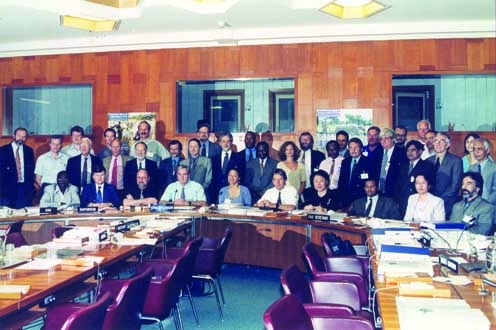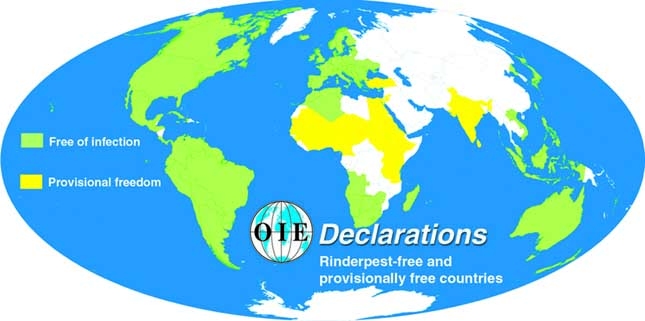

RINDERPEST
EMPRES EXPERT AND TECHNICAL
CONSULTATIONS ON GREP, MAY 2000
Two landmark meetings were held in Rome at the end of May 2000 in the context
of the Global Rinderpest Eradication Programme (GREP) coordination. Both
addressed the issue of Verification of Rinderpest Freedom. The Technical
Consultation brought together specialists from a range of disciplines and
senior animal health administrators from the key geographical regions for
rinderpest. There were also representatives from major bilateral and multilateral
donor groups, relevant international agencies and the International Office
of Epizootics (OIE), allowing a holistic approach to be taken. After reviewing
the latest information on the global rinderpest status, giving cause for
optimism that the affected areas will continue to decrease even within the
last remaining reservoirs, the meeting considered the requirements for disease
surveillance and reviewed options for demonstrating freedom from rinderpest.
The smaller Expert Consultation then proceeded to elaborate further on the
process to be adopted. The full proceedings of the meetings will be made
available in the near future.

The meetings recognized the need to regionalize GREP verification procedures
in order to accelerate progress and provided a basic plan to be elaborated
into a GREP Pathway. Validity of the existing OIE Pathway was endorsed and
it will continue to be encouraged and supported for national use. The GREP
Pathway replicates the overall approach of the OIE Pathway at the global
level, with adaptation to the different circumstances.
The most important elements of this new approach are:
-
All use of rinderpest for routine immunization programmes should cease by
the end of 2002 in preparation for a declaration of global provisional freedom
from the disease by 2003.
-
During the critical period from 2003 to 2005 there should be an intensive
public information campaign to increase awareness of the Global Rinderpest
Eradication Programme.
-
In the remaining areas at risk of rinderpest persistence, coordinated, regional
surveillance will complement existing national efforts. At the global level,
two well-designed "global" surveys are proposed within the critical path
to global freedom to verify the declarations of provisional freedom and freedom
from disease. These surveys will be restricted to areas known to have had
rinderpest after 1980 and will provide serological evidence and community
opinion of freedom. The GREP Pathway to freedom from infection will require
two rounds of serological surveys: one in 2004-2005 to ensure freedom from
disease and another in 2007 to ensure freedom from infection.
The Expert Consultation set out milestones
for GREP in the drive towards a World Without Rinderpest:
-
2002 cessation of routine rinderpest vaccination programmes
-
2003 declaration of global provisional freedom from rinderpest
-
2006 declaration of global freedom from rinderpest disease
-
2008 declaration of global freedom from rinderpest infection
-
2010 declaration of global rinderpest eradication
|
A global review group composed of two members from OIE, two from FAO, one
from the World Health Organization (WHO) and one from the International Atomic
Energy Agency (IAEA) will be formed to certify the process of the Global
Rinderpest Pathway to freedom from infection. This programme review group
should be established by 2003.
The Expert Consultation recommended the establishment of a GREP Technical
Steering Group to support the GREP secretariat in providing more immediate
scientific advice to target countries and regions on issues such as surveillance
and verification. Important matters that will need to be addressed include
the withdrawal of stocks of rinderpest viruses from all but a small number
of reference centres and the cessation of rinderpest vaccine production while
maintaining a vaccine reserve for emergency use.
WORKSHOP ON SURVEILLANCE
AND EPIDEMIOLOGY
Workshop on the Surveillance and Epidemiology
of Rinderpest and Improved Control of Other Major Diseases of Livestock,
held in Yemen
Yemen is one of the most important countries forming the focus of intensified
action for the Global Rinderpest Eradication Programme (GREP) because of
the conjectured persistence in that country of one of the last reservoirs
of Asian rinderpest. In response to a request from the Government of Yemen,
FAO has recently started implementation of a Technical Cooperation Programme
project (TCP/YEM/8923) which is of fundamental importance to GREP and Yemen.
The project was drawn up in collaboration with the Joint FAO/IAEA Division
to ensure complementarity of its activities with an IAEA project which is
phased to start early in 2001. The two projects are synergistic, with the
IAEA component extending support for strengthening laboratory diagnosis and
surveillance testing for major infectious diseases, especially rinderpest.
The project is also coordinated with the FAO/IFAD Regional Animal Disease
Surveillance and Control Network (RADISCON) project implemented through EMPRES.
The Workshop on the Surveillance and Epidemiology of Rinderpest and Improved
Control of Other Major Diseases of Livestock was held in Sana'a, Yemen from
26 to 29 June 2000. Participants included the Director-General of Animal
Resources, Department of Animal Health staff, Governorate Veterinary Services
staff and the Chairman of the Yemen Veterinary Association, who was an articulate
contributor to discussions.
Workshop participants stressed that livestock production and trade is of
major significance to the livelihoods of the Yemeni people, especially the
rural poor, and to the national economy. This understanding led to considered
statements that:
-
infectious diseases cause significant livestock losses and human illness,
often devastating to families in rural communities;
-
uncontrolled epidemics seriously affect livestock production and trade;
-
progressive control of the major infectious diseases of livestock is a core,
public good responsibility of the official Yemeni veterinary service that
merits a high priority in national planning;
-
there exist serious deficits in the structure and functioning of veterinary
services to meet their key responsibilities;
-
assured eradication of rinderpest is a national and international priority;
-
effective early warning and early reaction systems are essential for the
effective detection and control of disease epidemics;
-
current developments present an opportunity to create a functional structure
which involves all stakeholders in disease surveillance and progressive control
of the major diseases.
The last element was the focus of a considerable amount of heated discussion
because Yemen's agricultural services are currently involved in intensive
discussions with the World Bank concerning the nature of a structural adjustment
programme. The workshop participants framed several recommendations, among
the most important of which were:
-
The reorganization and strengthening of the Department of Animal Health should
ensure that it can fulfil its required role of leading and coordinating
progressive control of the major livestock diseases, which is a central and
ongoing function needing continuous and assured funding. The public good
functions must include provisions for disease surveillance, emergency
preparedness and disease management. It is necessary to ensure a direct line
of communication for disease information and direction between the Directorate
of the Department of Animal Health, its regional units and other components
of veterinary services responsible for service delivery to the livestock
owners.
-
Legislation needs to be enacted to facilitate the progressive control of
major livestock diseases of national economic and/or public health importance.
The Minister of Agriculture and Irrigation should issue a ministerial decree
to replace Decree 69/89 defining the responsibilities of the Department of
Animal Health and other organizations involved in the provision of animal
health services.
-
The Department of Animal Health should mount a national awareness campaign
for livestock owners and animal health workers concerning national issues
in the control of the major livestock diseases.
-
The Directorate of Animal Resources should initiate contact with neighbouring
countries and trading partners to devise measures to minimize the risk of
transboundary movement of epidemic diseases.
-
The Department of Animal Health should convene regular, ideally quarterly,
meetings of stakeholders in animal health to guide and coordinate planning
and implementation of public good animal health matters.
-
The Department of Animal Health should establish a comprehensive disease
surveillance system and contingency planning for disease emergencies, focusing
initially on rinderpest as a model.
-
The meeting confirmed the Directorate of Animal Resources' commitment to
eradicating rinderpest in accordance with the recommended international
guidelines of the Global Rinderpest Eradication Programme. This requires
the cessation of rinderpest vaccination in order to prove freedom. To start
this process, rinderpest vaccination from now on should be limited to vaccination
(with permanent marking) of imported cattle in quarantine stations, as a
temporary expedient. This use of rinderpest vaccine should also cease as
soon as there is sufficient confidence in rinderpest surveillance and emergency
preparedness, within the year 2001, and before then all rinderpest vaccines
should be withdrawn from the field. A contingency stock of rinderpest vaccine
should be maintained by the Department of Animal Health for use in an emergency.
OIE 63RD GENERAL
SESSION
Rinderpest-free countries
During the 63rd General Session of OIE held in May 2000, the
International Committee adopted Resolution XIII establishing a list of
rinderpest-free countries.
The baseline requirements in order to be declared free from infection were
the following:
1. Countries are free from rinderpest infection, as defined in Appendix 4.5.1.1
of the International Animal Health Code.
2. There has been no vaccination against rinderpest for at least ten years
and throughout that period there has been no evidence of disease or virus
infection.
3. An adequate permanent disease reporting system was maintained throughout
that period.






